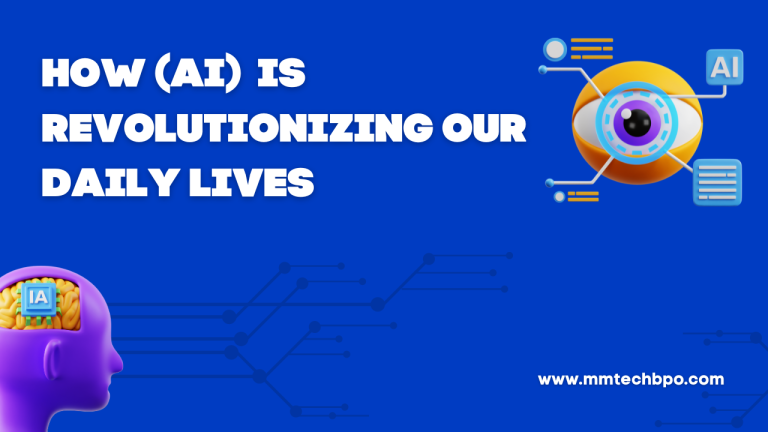Artificial Intelligence (AI) is no longer just a buzzword confined to tech conferences and science fiction. It’s woven into the fabric of our daily lives, influencing how we work, communicate, and even entertain ourselves. But what exactly is AI, and how is it reshaping our world? Let’s dive in.
What is Artificial Intelligence?
Before we explore AI’s various applications, let’s define it. AI refers to the simulation of human intelligence in machines designed to think and act like humans. These systems can learn from experience, adjust to new inputs, and perform human-like tasks. There are two primary types of AI: narrow AI, which is designed for a specific task (like voice recognition), and general AI, which has broader cognitive abilities similar to a human.
AI in Personal Assistants

One of the most familiar forms of AI is personal assistants like Siri, Alexa, and Google Assistant. These smart speakers and virtual assistants can manage our schedules, control smart home devices, and provide information on demand. Their ability to understand and process natural language has made them indispensable in many households.
AI in Communication
Language barriers are breaking down thanks to AI-powered translation tools. Apps like Google Translate use AI to provide real-time translations, making it easier to communicate across different languages. Additionally, chatbots are revolutionizing customer service by providing instant responses and handling queries efficiently.
AI in Healthcare
In the healthcare sector, AI is a game-changer. Diagnostic tools powered by AI can analyze medical images and detect diseases with remarkable accuracy. AI also plays a crucial role in personalized medicine, where it helps tailor treatments based on an individual’s genetic makeup, leading to more effective healthcare outcomes.
AI in Transportation
The transportation industry is on the brink of a revolution with AI at the helm. Self-driving cars, equipped with AI, promise to reduce accidents and improve traffic flow. AI systems are also used in traffic management to predict congestion and optimize routes, making commutes smoother and more efficient.
AI in Finance
Financial institutions are leveraging AI for various purposes. Fraud detection systems use AI to analyze transaction patterns and identify suspicious activities in real-time. Personalized banking services, driven by AI, offer tailored financial advice and manage customer portfolios with greater precision.
AI in Entertainment
From streaming services to video games, AI is transforming entertainment. AI algorithms recommend content based on our viewing habits, ensuring we always find something interesting to watch. In gaming, AI creates more realistic and challenging environments, enhancing the player experience.
AI in Education
Education is becoming more personalized thanks to AI. Intelligent tutoring systems can adapt to each student’s learning style and pace, providing customized support. AI also helps automate administrative tasks, allowing educators to focus more on teaching.
AI in Smart Homes
Smart homes are becoming smarter with AI. Home automation systems use AI to control lighting, heating, and security, making homes more comfortable and energy-efficient. AI also plays a role in energy management, optimizing the use of resources and reducing costs.
AI in Shopping
Online shopping experiences are being enhanced by AI. E-commerce platforms use AI to provide personalized product recommendations based on our browsing and purchase history. AI-driven customer service bots handle queries and complaints, improving the shopping experience.
AI in Security
Security systems are becoming more robust with AI. Surveillance systems use AI to detect and alert about suspicious activities in real-time. In cybersecurity, AI helps identify and mitigate threats, protecting sensitive information from cyber attacks.
AI in Workplaces
AI is transforming workplaces by increasing productivity and efficiency. AI-powered tools assist in project management, data analysis, and customer relations. In recruitment, AI helps identify the best candidates by analyzing resumes and predicting job performance.
The Future of AI
The future of AI holds endless possibilities. We can expect more advanced AI systems capable of performing complex tasks and making autonomous decisions. However, this also raises ethical considerations, such as the impact on employment and the need for regulations to ensure AI is used responsibly.
Conclusion
AI is undeniably revolutionizing our daily lives. From personal assistants that manage our schedules to diagnostic tools that save lives, the impact of AI is profound and far-reaching. As we continue to innovate and integrate AI into various aspects of our lives, it’s crucial to consider the ethical implications and strive for a future where AI benefits all of humanity.
FAQs (Frequently Asked Questions)
AI, or Artificial Intelligence, refers to the simulation of human intelligence in machines designed to think and act like humans. It can learn from experience, adapt to new inputs, and perform human-like tasks.
AI impacts healthcare by improving diagnostic accuracy, personalizing treatment plans based on genetic information, and optimizing administrative tasks, leading to better patient outcomes.
AI-driven cars are designed to be safer by reducing human error, which is a leading cause of accidents. They use sensors and algorithms to navigate and respond to their environment, although they are still under rigorous testing and development.
AI enhances cybersecurity by detecting and responding to threats in real-time. It analyzes patterns to identify unusual activities, helping to prevent data breaches and protect sensitive information.
The future of AI includes more advanced and autonomous systems capable of performing complex tasks. However, it also involves addressing ethical concerns, such as job displacement and ensuring AI is used responsibly and fairly.




